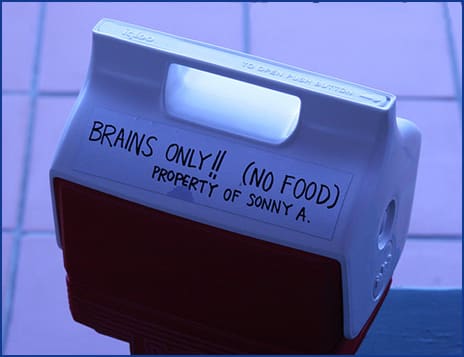
The Wall Street Journal‘s Melinda Beck brings news of another way to help people recover from obesity. For years, deep brain stimulation (DBS) has introduced astonishing change into the lives of patients suffering from Parkinson’s disease. Going by the evidence of early trials, DBS can also help those with Tourette syndrome, Alzheimer’s disease, and even addiction.
If, as Dr. Pretlow and many other health professionals believe, much obesity is caused by food addiction, then this is indeed significant news. Beck quotes Helen Mayberg, the neurologist in charge of Emory University’s study of DBS, who says of the subjects:
… [T]hey are not just getting well, they are getting well without side effects and without relapsing…
The reporter also spoke with mood disorders expert Paul Holtzheimer, who specified that DBS can only be employed when the operating physicians have “a good idea which brain regions aren’t functioning appropriately.”
Back in 1954, researchers James Olds and Peter Milner discovered pleasure centers in the brains of lab rats, and, 40 years later, Michael A Bozarth wrote of a 1965 study:
Laboratory animals will lever press at high rates (> 6,000 times per hour) to obtain brief stimulation pulses to certain brain regions… The potency of this electrical stimulation is most dramatically illustrated in a classic experiment where the subjects suffered self-imposed starvation when forced to make a choice between obtaining food and water or electrical brain stimulation.
In other words, the furry little subjects kept pressing those levers for jolts to their pleasure centers, even if it meant starving to death. No wonder Holtzheimer stresses that correct targeting of the area and precise positioning of the “pacemaker for the brain” are of course essential, and adds:
… [Y]ou need to do the clinical trials and have good evidence of the safety and efficiency to balance the invasiveness of the surgery.
No kidding! A wire in the brain is hardcore. The accouterments also include continuation of the wire beneath the patient’s skin and a battery pack implanted in the chest. Beck says:
It can take months to fine-tune settings on the battery pack and adjust medications to give patients optimal movement control… And as with other surgeries, there is a risk of infection, stroke or other complications. Some patients find their speech slurred after the surgery, and others report falling issues.
Rigged up like this, a person cannot be subjected to an MRI diagnostic test, or go through a security scanner. But if this $60,000 procedure can put a stop to the uncontrollable urges and cravings that characterize an addiction, for instance, to food, all the expense and inconvenience could be worthwhile. Beck quotes a patient suffering from major depressive disorder who said, post-wire:
I was sleeping better. I wasn’t binge eating. I didn’t have any suicidal thoughts.
This particular woman had already tried transcranial magnetic stimulation, as well as more than a hundred old-fashioned shock treatments, without relief, so such an endorsement is very encouraging. Trials aside, approval for widespread use of this therapy will be needed by the Food and Drug Administration, which is kind of odd, since the wire is neither a food nor a drug.
When a case is so extreme as to require surgery, the brain wire seems to hold more promise than bariatric surgery, which entails unpleasant side effects and has an unsatisfactory success rate. Of course, the best way is always, if possible, to get in there with some kind of intervention before true addiction sets in, and avoid any surgery.
Your responses and feedback are welcome!
Source: “Wiring the Brain, Literally, to Treat Stubborn Disorders,” WSJ.com, 01/17/12
Source: “Pleasure Systems in the Brain,” AddictionScience.net
Image by joestump (Joe Stump), used under its Creative Commons license.

 FAQs and Media Requests:
FAQs and Media Requests: 











